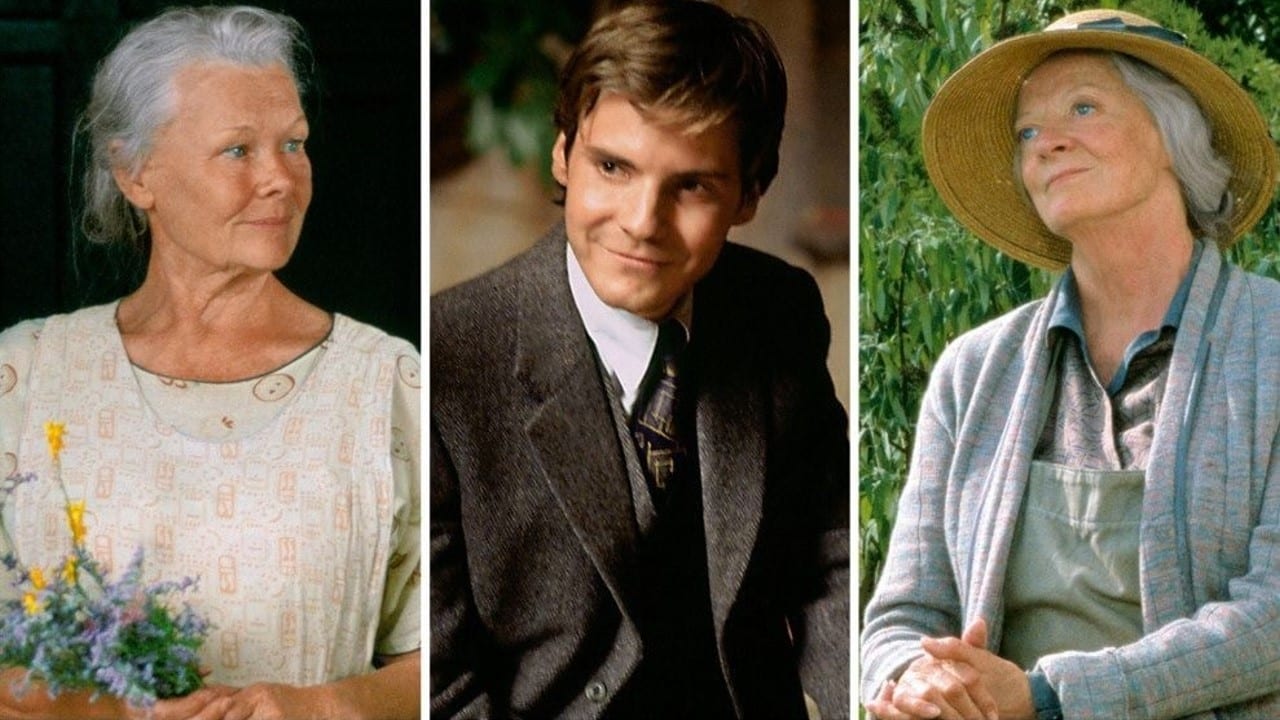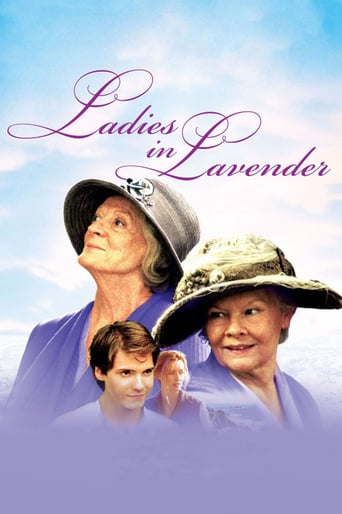

Plot so thin, it passes unnoticed.
... View MorePerfectly adorable
... View Moren my opinion it was a great movie with some interesting elements, even though having some plot holes and the ending probably was just too messy and crammed together, but still fun to watch and not your casual movie that is similar to all other ones.
... View MoreThrough painfully honest and emotional moments, the movie becomes irresistibly relatable
... View MoreThis beautiful movie has great moments of humour and tenderness as two elderly sisters rescue a young man and help him regain his health after he is washed up on a beach near their home in southwestern England. The time is the 1930's, when the emotional scars of World War I made people in England suspicious of "foreigners". Yet this movie shows them following their best instincts. The movie is brilliant in its treatment of village life and the way the two sisters, admirably performed by Judi Dench and Maggie Smith, gave the young Polish violinist (Daniel Bruhl) the care, rest and medical assistance he needed to launch his career. The background photography captures a landscape that is rugged and pastoral. There is an excellent supporting cast who all do their part to help the young man. In the end, we see how the acts of kindness lead to a rewarding outcome without knowing how everything unfolded. The identity of the youth is a mystery and remains such, leaving the viewer to imagine what the possible scenarios could have been, given the political upheaval of the time. We also come to know the two women, "ladies in lavender", who find an affection for the youth that helps heal their own unfulfilled desires; in the case of Janet (Maggie Smith), a husband lost in the previous war and Ursula, no love at all in a world where many young men never returned home. Perhaps this movie shows how good can come out of disappointment.
... View MoreThis was a very beautiful movie! I liked the setting in the Cornish fishing village, and they had also managed to get the feeling of the times (1930:s) just right. And all the actors were just excellent! It was also very sad, with the old spinster's hopelessly impossible unrequited passion for the young man... Who has not nursed a secret passion, and saved little mementos of the loved one, at one time or another in our lives..? In fact, I blushed in front of the screen a couple of times, as the old woman's behaviour made me remember embarrassing things I have done myself...Although I think the story would have been still more effective, if the woman had been a little younger. Maybe in her 40:s or 50:s instead of her 70:s. It would have been easier to relate to it then, and feel sorry for her... That is: I _did_ feel sorry for her now as well. It wrung my heart when the young man left with a beautiful woman of his own age - something that _had_ to happen before or later. But an age difference of about 50 years is simply indecent - insane.Or, alternatively, if her love for him had not been sexual at all, but only long repressed denied motherly feelings - as she had never had any children either, as well as no husband... That would have been nicer, I think.
... View More"If music be the language of love, play on"- Very true statement you know.I wasn't expecting to like Ladies in Lavender, but being a lover of both Maggie Smith and Judi Dench, I knew I had to see it. And you know what? I loved it, admittedly it is very slow and perhaps the ending a little abrupt, but essentially it is beautifully-acted, directed and rendered, that I actually found very moving.First of all, I loved how it was filmed. The setting is old fashioned, but it is exquisite to look at as well. Some parts are like looking at a watercolour painting, seeing how picturesque it all was. The scenery was sumptuous and the costumes gorgeous. And the music from Nigel Hess was utterly amazing, some of the melodies played on the violin is close to heart rending. Although the violin can play sinister and devilish pieces like Danse Macabre, it also works bringing to life poignant works like Meditation from Thais and Tchaikovsky's Melody. The music composed I think was one of those elements that made the film so touching, it was extremely beautiful.The direction from Charles Dance, who acted so well in Bleak House, is subtle, and this allows each actor to bring their character and the sophisticated screenplay to life. The story is nimbly told, about the upheaval and yearning when a handsome young man(with a catch-he can't speak English) is found washed up on the beach, and goes into very subtle emotional regions.And the cast is exceptional. Maggie Smith doesn't get as much screen time as Dench, but she gives a very strong performances as always as the voice of reason. Judi Dench is also exceptional in a difficult role as Ursula, and Daniel Bruhl is indeed handsome as the handsome stranger Andrea. The supporting cast were outstanding as well, Natascha McElhone, David Warner and Miriam Margoyles give suitably deft performances and it works for this sort of film.Overall, very beautiful and touching, particularly worth seeing for the acting and the music. 9/10 Bethany Cox
... View MoreMaggie Smith and Judi Dench have always managed to amaze me. This tender story is the type of film we need to show our children more of. They need to learn compassion for other cultures, because you never know when you will be helping a genius! Good plot, well-written screenplay and good job to all the actors! Good-luck to very very handsome Daniel Bruhl, also. The musical score of this film made me cry. The oboe and violin were absolutely breath-taking. Judi was also in Pride and Prejudice, so obviously she can portray any character! Thanks to Joseph Bell, without whom, we would not have had that wonderfully delightful music for this film.
... View More